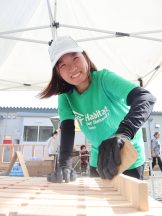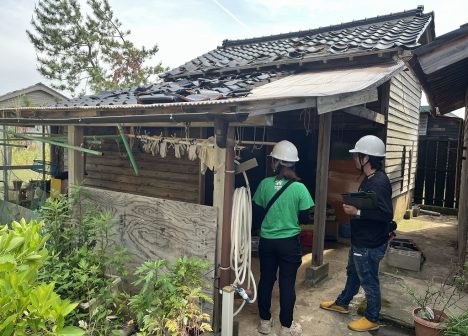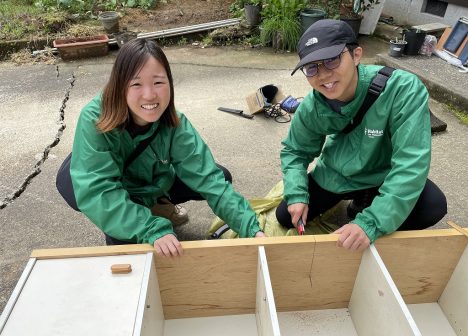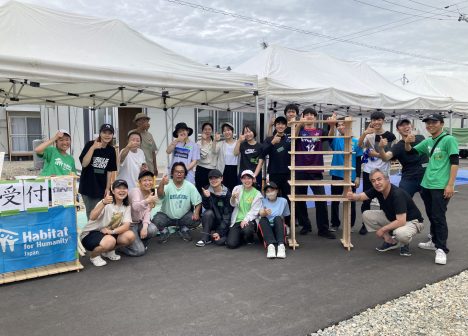Eight months have passed since the New Year’s Day Noto Peninsula earthquake. As the situation evolved, Habitat Japan shifted the focus of our activities from emergency response to reconstruction efforts, and began cleaning up damaged houses, providing architectural consultations services for damaged homes, and building shelves to furnish temporary housing units. Helping coordinate these activities, two students from Habitat's Japan’s campus chapters have worked onsite in Monzen-machi as student interns since April. One of them is Todaka-san, a 4th year student at a university in Kobe City. Todaka-san assisted field operations for three months before leaving to study abroad. We are pleased to be able to share their observations and learnings gleaned from their three-month internship in Noto.
 Thank you very much for having me as an intern.
Thank you very much for having me as an intern.
Nestled between mountains and the sea, Monzen-machi, Wajima City, is home to gentle winds and kind people. At first, I didn’t have any specific goal in mind. I had a vague desire to be of help to people, and I made the decision to act on it through this internship.
Before making my way to Monzen-machi, I could only imagine kind of life denizens were leading going three whole months without water, and worried what they might think of an outsider inserting themselves into the community at this time. After going, I quickly learned that these worries were unfounded.
My first journey to Monzen-machi was in March, not as an intern but as a volunteer alongside 13 other students from campus chapters all over Japan; I started my internship after that in April. About four months had passed since the disaster, but streets were still framed on both sides by devastated homes. This married with the fact that road and water infrastructure remained with little progress, you could think the earthquake struck yesterday. Despite all this, residents stay resolute and hopeful, remarking “there are people worse off than us.” While outwardly they were cheerful, as I spoke with residents I could sense their impatience for the snail’s pace of restoration work and frustration at the shortage of contractors preventing many from even beginning to repair their damaged homes. They asked “What about my house? What about my job? What about my family?” and were burdened by an abundance of choices needing to be made and anxiety for the future. Witnessing the residents’ misfortune, I felt helpless at times, but I was reminded of the things I could achieve by taking small steps and focusing on one problem at a time.
I don’t have the strength to carry large appliances and furniture, but I can help clean up a house by cleaning and organizing small things, often filled with precious memories. I don’t have the expertise to offer advice like an architect, but by lending an ear and sharing kind words I was told residents were able to get things off their chests and feel a bit better. I did my best to do all I could to help in the here and now. I was often told that it was great that I was volunteering in a disaster area. But to me, my time in Noto felt more akin to co-living rather than volunteering. Holding shelf-building workshops at temporary housing sites, residents contributed their expertise as if they were carpenters, bring their own tools and sharing information on different types of wood and ideas of what to build. When we would help carry things in and out of homes, they would offer us cold drinks and snacks.
Whether it be kind words or gifts, I feel like I’ve received a lot more than I’ve given. Looking at a disaster area, it’s easy to point out things that are missing or have gone wrong. There’s no water and the roads are damaged, but it’s times like these especially where it is important to be grateful for the things we do have: Being able to take a bath, do laundry, eat a hot meal, and connect with the community and people around us every day. While it’s important to be prepared for disasters whenever they may occur, I believe it’s also important to appreciate the mundane and cherish those around us while we can.
Lastly, I’d like to express my gratitude for this opportunity to work in Monzen-machi. There is a saying in Noto that “Noto is kind down to its soil”. Interacting with the people of Monzen-machi, I learned that this saying is true. As my first time in a disaster area, sometimes I could be at a loss, but with the kind support of residents, other organizations, and Habitat staff, I was able to rise to the occasion and face new challenges. I am grateful for the kind people who told me “Come back anytime” and “We’ll be waiting for you”. In only three short months I’ve made so many precious memories and been graciously welcomed to a new community that I will forever treasure.
Not only residents of Monzen-machi, but Habitat staff too were inspired by Todaka-san’s smile and her willingness to take on any challenge. Student volunteers from Habitat Japan’s campus chapters were also inspired by Todaka-san, who led by example and showed just how much of an impact one youth can make even in the face of disaster. We thank you for your three months of fieldwork in Monzen-machi.



